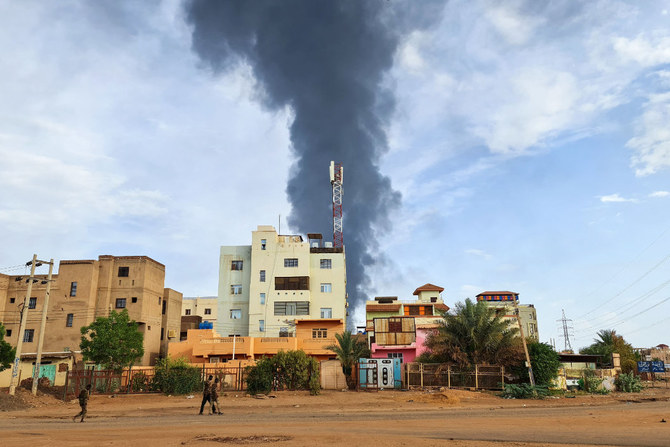United approach needed to resolve the Sudan conflict

https://arab.news/c6h45
Before the point of no return is reached, a powerful collective approach is required in order to find a solution that will permanently end the war in Sudan.
If a domestic conflict is not addressed adequately and immediately by the international community, it can turn into a decade-long war, such as what the world has witnessed with the protracted Syrian civil war.
In addition, the longer a conflict continues, the more difficult it becomes to chart a path that will bring peace, stability and security back to the conflict-affected nation.
The continuation of a domestic war can also lead to the collapse of the state. And it is critical to note that failed states not only pose a significant threat to their own population, but also to other countries, as well as regional and global stability. To be more specific, on the international level, according to the Carnegie Endowment for International Peace, failed states can become “safe havens for terrorist organizations, centers for the trade of drugs and arms, and breeding grounds for dangerous diseases. Regionally, they can spill instability well past their borders and create a conflict dynamic affecting neighboring countries.”
This means that international intervention is needed to prevent the conflict in Sudan from escalating and turning the country into a failed state. To begin with, multilateral and unilateral actions ought to be taken simultaneously. However, this does not mean that military options should be pursued.
Instead, the international community can take a unified stance against the war in Sudan. This means that many countries can come together and use their political leverage in order to impose diplomatic pressure on the parties involved in the conflict.
This can be more effectively achieved if it is implemented in close partnership with African countries, especially those that are directly affected by the war in Sudan. For example, countries such as the US and the European nations can cooperate closely with African governments including those in Egypt, Ethiopia, Libya, Eritrea, Chad and the Central African Republic.
Secondly, countries that have strong economic ties with Sudan can use their financial leverage to pressure the parties engaged in the war into negotiating a ceasefire. This can include keeping humanitarian corridors open in order to allow humanitarian and medical assistance to enter the affected areas and to permit the evacuation of civilians from the conflict zone. Otherwise, the armed conflict in Sudan could spiral out of control and impact the whole Horn of Africa region.
Some of the countries that are considered the top trading partners of Sudan are Egypt, China, the UK, Germany, Turkiye and Russia. If these countries were to unite and employ diplomacy alongside their economic leverage, this could prove to be very effective in bringing the Sudan conflict to an end.
International intervention is needed to prevent the conflict in Sudan from escalating and turning the country into a failed state.
Dr. Majid Rafizadeh
Of course, mediation should also be pursued at the same time, as this plays a critical role in helping to encourage reconciliation between the parties involved in the conflict. Several countries have already shown their desire to resolve the situation by reaching out to the Sudanese leaders. For example, Saudi Arabia and the US last month jointly introduced an initiative that focuses on making a distinction between civilians and combatants. The Jeddah Declaration of Commitment to Protect the Civilians of Sudan aims to ensure the safe passage of civilians, protect medical personnel, allow humanitarian relief to reach the population and prevent the recruitment of children as soldiers in the war.
In addition, in order to take firm action, it is important for the international community to be cognizant of the fact that a protracted conflict in Sudan poses several serious threats. One threat is the humanitarian disaster, which could get even worse if the conflict continues. The UN World Food Programme this month pointed out that an estimated 2 million to 2.5 million people in Sudan are expected to “slip into hunger in the coming months because of the ongoing violence. This would take acute food insecurity in Sudan to record levels, with more than 19 million people affected, 40 percent of the population.”
Another threat that could affect millions of people is that the continuation of the conflict could cause the total collapse of the healthcare system in Sudan — and this could lead to disease outbreaks affecting other countries as well.
Many hospitals are not currently functional in the capital Khartoum, putting a lot of pressure on medical staff. According to Islamic Relief Worldwide: “The rainy season is due to begin in June and the destruction from weeks of fighting makes outbreaks of water-borne and vector-borne diseases such as malaria, cholera and chikungunya even more likely. In Khartoum and parts of Darfur, there are still dead bodies lying in the streets, water infrastructure is damaged, garbage is piling up and most hospitals are still not functioning — all adding to the risk of diseases spreading and water sources being contaminated.”
Finally, the refugee crisis could worsen, potentially affecting several other countries. Sudan shares borders with seven countries — Libya, Egypt, Chad, the Central African Republic, South Sudan, Ethiopia and Eritrea — and these would be the first to be impacted.
In a nutshell, the international community must form a united front by employing its diplomatic and economic leverage in order to halt the conflict in Sudan. The longer the conflict goes on, the more likely Sudan is to become a failed state. This poses a severe threat to the Sudanese people, as well as to regional and global stability. The international community must take action now.
• Dr. Majid Rafizadeh is a Harvard-educated Iranian-American political scientist.
Twitter: @Dr_Rafizadeh









































